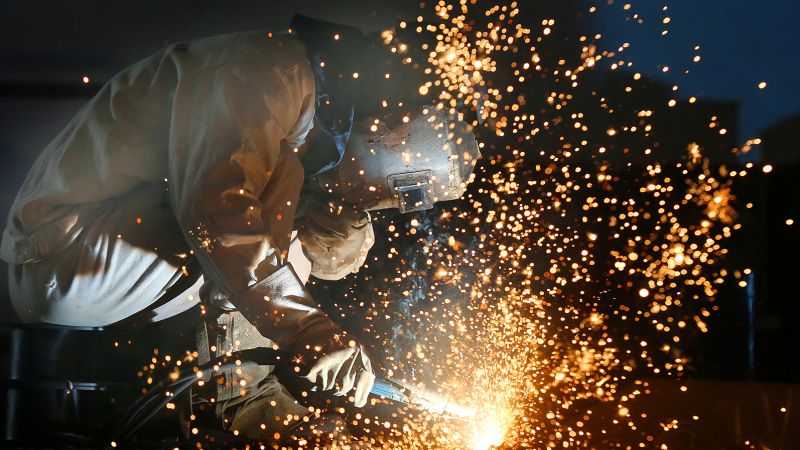Momentum from an economic recovery in China early this year has faded further, with activity in the services industry and construction sector dropping to its weakest level since December, according to official data released Friday.
The non-manufacturing Purchasing Managers’ Index, an important reading of sentiment in the services and construction sectors, fell to 53.2 in June from 54.5 in May, data from the National Bureau of Statistics showed.
The sub-index for services activity also fell to a six-month low, reaching 52.8 in June. The services sector is crucial to China’s economy. It accounts for 58% of GDP and 48% of employment.
Following the release of the data, the Chinese yuan weakened in onshore trading to its lowest level since November, at around 7.26 per dollar.
The currency has slumped 5% this year as sentiment soured regarding China’s growth prospects, as well as the widening gap between Chinese and US interest rates.
In March, the non-manufacturing PMI had surged to its highest level in nearly 12 years, boosted by a resurgence in consumer activity as the country emerged from three years of Covid lockdowns. But momentum has slowed in recent months.
“The main engine of growth is spluttering,” said Robert Carnell, regional head of research for Asia-Pacific at ING Group. “Official PMI data confirms that the re-opening surge in the service sector is subsiding.”
The services and construction sector, spurred by consumer spending, had been keeping China’s economy growing in the first half of this year as the manufacturing sector lagged behind, he said. Friday’s data confirms that the initial surge in economic expansion had contained a lot of pent-up demand, which has not continued.
“Domestic tourism and dining out have been making up for lost time in the early part of the year. But there is only so long that this can go on,” Carnell said.
The manufacturing PMI, a key indicator of factory activity, reached 49 in June, according to the National Bureau of Statistics on Friday. That was a slight improvement from May’s 48.8, but indicated the sector is still contracting.
A PMI reading above 50 indicates expansion, while anything below that level shows contraction.
“China’s reopening recovery continued to lose momentum in June,” analysts from Capital Economics wrote in a Friday research report.
“Looking forward, policy support will be key to preventing a further deceleration in growth,” they added.
To bolster growth, the People’s Bank of China cut its main benchmark lending rates last week for the first time in 10 months. Many analysts said the move wasn’t enough and called for a much bolder stimulus package, including direct measures to boost consumption and the housing market.
On Thursday, Premier Li Qiang chaired a cabinet meeting, where he said the government plans to take measures to promote household consumption.
“Taking targeted measures to boost [household consumption] is conducive to driving growth in consumer spending and economic recovery,” he said in a statement.
At a forum earlier this week, Li struck a bullish tone about the Chinese economy, telling a gathering of global financial elites that growth in the current quarter will be higher than it was in the first three months of the year.
Li said the government is on track to achieve its growth target of “around 5%” for this year, and pledged to do more to support the recovery.
— CNN’s Wayne Chang in Taipei contributed to reporting.
Read the full article here




